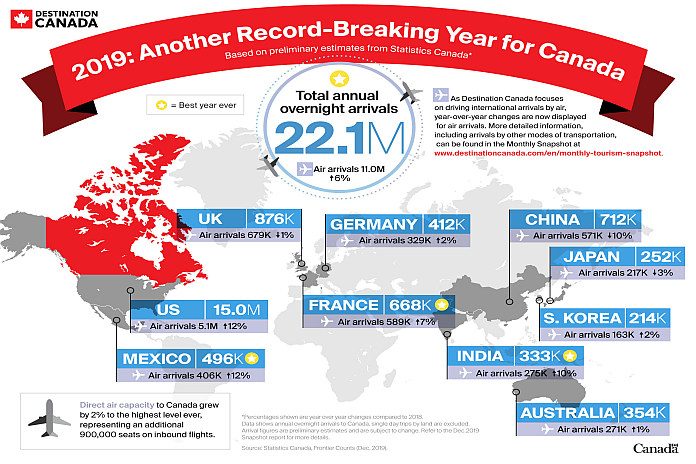VANCOUVER, Canada – Tourism plays a significant role in the national economy, generating an estimated $104.9 billion in tourism expenditures in 2019, supporting approximately 1 in 10 jobs in communities across Canada and contributes an estimated $43.5 billion in Gross Domestic Product.
Destination Canada – Canada’s national marketing organization, recognized a third consecutive record-breaking year with 22.1 million travellers to Canada in 2019 according to Statistics Canada.
“This record number of arrivals shows once more that tourism is a strong and sustainable sector that benefits businesses and communities, large and small, across Canada,” said the Mélanie Joly, minister of economic development and official languages. “By working together, we are inspiring travellers to visit more parts of the country in all four seasons, to experience Canada’s diversity and inclusivity, to taste its culinary delicacies and to discover its Indigenous peoples.”
Destination Canada supports the growth of the visitor economy through data-driven marketing strategies that stimulate international demand and tourism export revenue for Canada in 10 countries: Australia, China, France, Germany, India, Japan, Mexico, South Korea, the UK, and the US. This diversified set of source markets allows for continued growth, even when some regions experience uncertainty.
“It is thanks to the hard work and passion of the millions of Canadians who contribute to this sector that we are experiencing another record-breaking year for tourism. It also reinforces that our Team Canada approach with our industry partners across the country is working and we are increasing Canada’s international competitiveness,” said Ben Cowan-Dewar, chairperson of destination Canada’s board of directors.
“Looking to 2020, we will continue to share relevant data, market intelligence, and industry analysis with our partners to ensure we are promoting relevant, meaningful content to our audiences. This is especially relevant given the uncertainty around the impact of the coronavirus or COVID-19 outbreak. We are committed to working with our industry partners to continue inspiring those with glowing hearts to fall in love with Canada.”
In addition to Destination Canada’s marketing efforts, the continued growth in the tourism sector is attributable to a variety of factors such as the government of Canada maintaining renewed visa requirements for key markets making it easier for more people to travel to Canada. There have also been new flight destinations added and increased service on pre-existing routes to several Canadian airports opening up additional air access.
Key highlights
- 2019 was the best year for Canadian tourism on record, with arrivals reaching 22.1 million, breaking the 22 million mark for the first time ever.
- Overnight arrivals to Canada from countries other than the United States reached an all-time high of 7.15 million (2018: 6.7 million). Overseas tourists typically stay in Canada longer and spend more, helping to achieve Destination Canada’s high-yield strategy.
- The United States saw a strong year in air arrivals with 5.1 million (2018: 4.6 million) and a solid rebound in automobile crossings with 8.5 million (2018: 8.2 million). Overall, the US had another record-breaking year with 14.99 million total arrivals.
- Mexico once again experienced impressive growth with 495,627 total arrivals, with a particularly notable increase of 12.4 percent in air arrivals. The Mexican market has continued to grow since changes to visa requirements at the end of 2016, which spurred demand for travel to Canada, prompting airlines to increase air service.
- India saw a 9.7 percent increase in air arrivals helping achieve a new annual record for this market with 333,111 arrivals (2018: 287,416).
- Improvements in international air access to Canada helped stimulate travel with non-stop air services adding 2.2 percent more seats in 2019.





